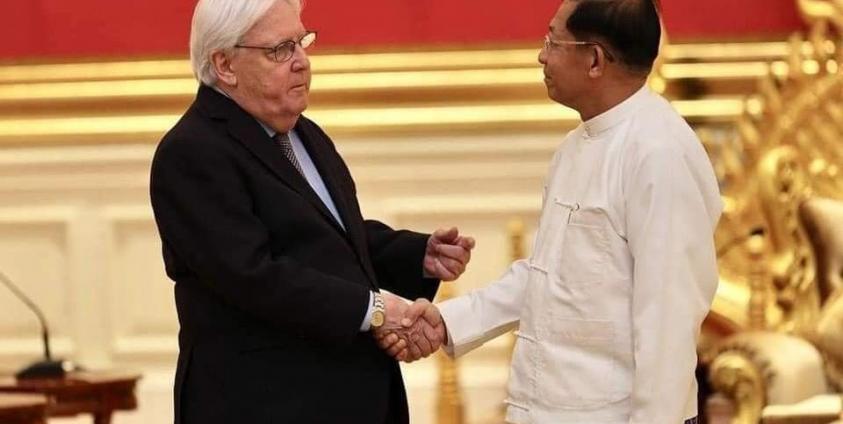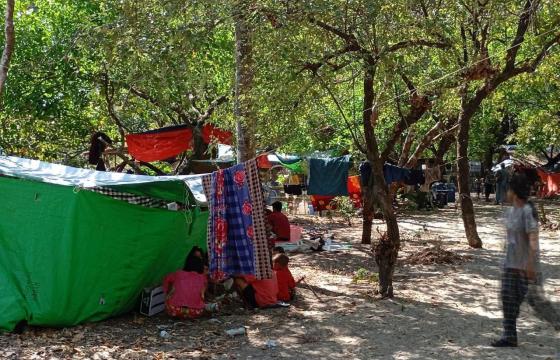Visit of UN Aid Chief to meet General Min Aung Hlaing fails
A joint statement by over 500 regional and international civil society organizations has condemned the recent controversial visit of Mr. Martin Griffiths the UN’s chief for Humanitarian Affairs (UNOCHA), for allowing this trip to Myanmar to be used by the Junta for propaganda purposes.
The ostensible UN objective was to push for the Junta to un-block aid distribution so that aid could reach all parts of Myanmar. State -controlled media happily published photos of the UN leader of OCHA meeting with Junta chief General Min Aung Hlaing but with no information about any agreements.
Daw Khin Ohmar, the Director of the Board at Progressive Voice (PV) and the official spokesperson for the statement issued on August 22nd by 500 civil society organisations stated, "We have consistently emphasized that UNOCHA's engagement with the Military Council, without collaboration with capable on-ground actors like NGO, politically-led entities like ERO along with forces and civil society organizations, is misguided. This is the basis for our assertion that such an approach is unlikely to yield positive outcomes," she conveyed to KIC.
The UN press office has also completely failed to disclose the results of these talks with the dictator on aid , underscoring UNOCHA's weakness and flaws in addressing the urgent humanitarian needs of Myanmar during this crisis. Civil society has concluded that the UN’s Martin Griffiths never addressed the central issue of how the Junta has weaponized humanitarian aid, and the UN collusion with Junta-control over UN aid distribution.
The joint statement underscored a critical concern: the imperative for UN entities, including UNOCHA, to sever ties with the illegitimate regime ,which is manipulating and weaponizing humanitarian aid as a tool of control.
Civil society organizations warn that the actions of UNOCHA could potentially escalate the Military Council's acts of terrorism across the entire nation, thereby exacerbating Myanmar's humanitarian aid crisis.
The statement emphasized the overwhelming need of UNOCHA staff all based in Yangon reaching out to central, southeastern, and northwestern Myanmar—regions where hundreds of thousands of internally displaced persons (IDPs) are under systematic assault by the Military Council while denied any international aid being distributed under the auspices and permits of the illegal regime that is not recognized by the UN in New York.
They also urged setting up of a coordination corridor among political and revolutionary organizations actively operating on the ground, including those involved in cross-border aid.
Christopher McGuinness,a former UN aid worker who set up MAP (The Myanmar Accountability Project) in the UK after the coup. He argues that “ Donors must also find new and innovative ways to work outside the confines of a UN country team and around the junta, which is forcing the UN to deliver aid largely to areas it controls. Cross border assistance to non-junta-controlled areas must be ramped up, as must cash assistance through Myanmar’s nationwide network of formidable citizens-based organisations.”
"The primary objective is to establish meaningful connections with ethnic forces, political entities, and local civil organizations. This strategic approach holds the key to achieving significant success. Rather than focusing solely on the capital Nay Pyi Taw, their efforts should involve engaging and conferring with the aforementioned groups to ensure the efficacy of aid distribution. The pathways are already in place; UNOCHA simply needs to facilitate cooperation by opening the door," explained Daw Khin Ohmar, Director of the Board at Progressive Voice (PV).
The statement urged that rather than attempting to resurrect a failed humanitarian model, UNOCHA should focus on innovation through support for local organizations that are actively engaged. Effective and comprehensive assistance for populations impacted by international war crimes, can only be achieved by collaborating with legitimate stakeholders, as emphasized in the statement.
A total of 514 regional and international organizations, encompassing Progressive Voice, Karen Peace Support Network (KPSN), Karen Women's Organization (KWO), and Karen Human Rights Group (KHRG), along with 260 organizations that remained unnamed, came together in joint endorsement of the statement.
Likewise, the National Unity Government (NUG) held an online meeting with the leader of UNOCHA on August 21, advocating for humanitarian aid. During this meeting, the NUG highlighted the necessity for UN organizations to modify their approach to establish more effective connections with on-ground organizations.








